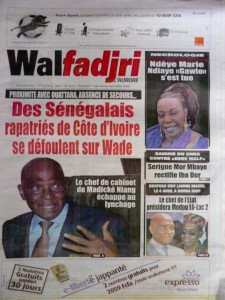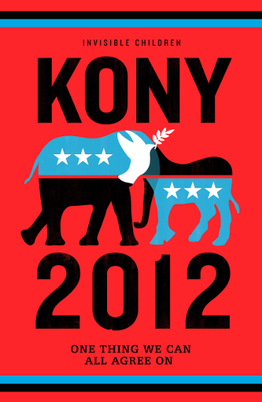The #Kony2012 campaign led by the Invisible Children NGO certainly contained a few over-simplifications about Africa. This prompted a counter-campaign #WhatILoveAboutAfrica aimed at rectifying these ‘stray shots’.
Inaccurate media descriptions of Africa are not a rare phenomenon – even if the comedy of errors has steadily declined over the last few years. The misrepresentation of the continent in the media is not a trivial subject, as Professor Charles Moumouni explains [fr]:
La mauvaise représentation de l’Afrique dans les médias occidentaux n’est ni un
phénomène nouveau, ni un phénomène exceptionnel. Elle fait l’objet de préoccupations depuis les années 1970, notamment dans le cadre des discussions sur le Nouvel ordre mondial de l’information et de la communication (NOMIC). Mais l’image que propagent les médias occidentaux de l'Afrique est d’autant plus préoccupante qu’elle influe négativement sur les efforts de développement de l'Afrique
Poor representation of Africa in Western media is neither a new nor an exceptional phenomenon. It was already a subject of concern during the 1970s, notably in the context of discussions about New World Information and Communication Order (NWICO). But the image of Africa currently being propagated by Western media is all the more concerning as it adversely effects African development efforts.
African media itself, however, is certainly not immune from criticism of this sort. Several initiatives have emerged, in recent years, to help improve the accuracy of African media. The African Media Initiative and Media Monitoring Africa are just two examples.
Here is a summary of the gems, errors and other inaccuracies in global media coverage of Africa and in the African media itself:
Global media coverage of Africa
Canada – RDC: “Stephen Harper enters Africa's heart of darkness”
This was the title given to a CBC news article concerning the Canadian prime minister's visit to the Democratic Republic of Congo (DRC) during a summit of the International Organization of the Francophonie. Although the title refers to Joseph Conrad's book, Heart of Darkness, it also evokes an outdated, condescending vision of black Africa as a savage, dangerous land. The article adds:
It's the most wretched country on the face of the earth.
The article makes it seem as though prime minister Harper ought to be given a medal for his courage in visiting the DRC.
Israel – “Sub-Saharan Africans are not rapists”
Slate Afrique explains the context of this original (to say the least) headline [fr]:
Les noirs ne sont pas des violeurs. Tel est le message que veulent faire passer des demandeurs d'asile Africains subsahariens en Israël. Ces derniers sont pointés du doigt par l'opinion publique israélienne à la suite d'un cas de viol très médiatisé, ayant impliqué quatre demandeurs d'asile érythréens en Israël. Pour contrer une stigmatisation des noirs, un centre d'aide aux travailleurs étrangers a aidé des Africains à rédiger des «lettres ouvertes au peuple israélien», rapporte le quotidien israélien Haaretz le 20 mai.
Blacks are not rapists. This is the message that asylum-seeks from sub-Saharan Africa want to make heard in Israel. Israeli public opinion had been pointing the finger at sub-Saharan asylum-seekers after a highly publicized rape trial implicated four Eritreans. The Israeli daily Haaretz reported on 20 May that to counter the stigmatization of black people, a support center for foreign workers has been assisting Africans in preparing “open letters to the Israeli people”.
France – Confusion between Guadeloupe and Madagascar for I-télé
The clashes in Guadeloupe between the Liyannaj Kont Pwofitasyon [note: leading body for trade unions and social movements] and security forces coincided with the most intense political crisis in Madagascar. The two events were so close to each other in time, in fact, that I-télé (a cable-TV news channel in France) compiled the following little montage in which the commentary confuses the events in Guadeloupe with those in Madagascar [fr]:
USA – DRC: “Orphaned, raped and ignored”
This is the title of an article by journalist Nicholas Kristof about a 9 year-old child that was the victim of gang rape in the DRC. As Laura Seay explains in a translation on Slate Afrique, this article raises several ethical issues [fr]:
Après de violentes polémiques, Kristof posta une réponse sur son blog dans laquelle il promettait de ne pas le refaire, tout en réfutant les critiques affirmant qu’il mettait l’enfant en danger en l’identifiant. Il reconnut cependant qu’imprimer son nom violait la politique du Times, même s’il avait reçu l’autorisation d’une femme qui jouait le rôle de tutrice de l’enfant. Difficile d’imaginer un rédacteur en chef, quel qu’il soit, laisser une telle «bavure» se produire dans un article concernant une victime occidentale de pédophilie.
After several forceful debates, Kristof posted a reply on his blog in which he promised not to do it again – all the while refuting criticism that he had endangered the child by identifying. He recognized, however, that the publication of the child's name violated the policy of The Times, even if he received permission from a woman playing the role of the child's guardian. It is difficult to imagine an editor in-chief that would have allowed for such a ‘blunder’ to occur in an article concerning a Western child-abuse victim.
African media
South Africa – Rape-victim indirectly identified in an October 2012 report
Musa Rikhotso reports that:
A story sourced from Sapa entitled, “Sentence Slashed over rape of Stepdaughter” (The Star, 10/10/2012, p.7). The article names a Limpopo man, whose sentence was reduced from life imprisonment to 1- years for raping his 15-year-old stepdaughter; in so doing, failing to protect the identity of the rape victim.
Senegal – “Senegalese repatriated from the Ivory Coast”
During the height of the crisis in the Ivory Coast, the Walfadjiri-l'Aurore ran the headline “Senegalese repatriated from the Ivory Coast take it out on [President] Wade“:

Page 2 of a Senegalese daily containing an article about the crisis in the Ivory Coast- public domain
Le Post explains that this was an error [fr] because:
justement ces hommes et femmes reprochent au gouvernement de n'avoir pas été “rapatriés” mais bel et bien d'avoir du rentrer par leurs propres moyens.
these men and women criticized the government precisely because they had not been “repatriated” but had been simply required to return by their own means.








2 comments